Daily Vocabulary Words: List of Daily Used Words in Leading International Newspapers
Hi there. Welcome to this special section @ Wordpandit.
Our endeavour here is very simple: to highlight important daily vocabulary words, which you would come across in leading newspapers in the country. We have included the following newspapers in our selection:
• The New York Times
• The Washington Post
• Scientific American
• BBC
• The Guardian
• Psychology Today
• Wall Street Journal
• The Economist
We are putting in extensive work for developing your vocabulary. All you have got to do is be regular with this section and check out this post on a daily basis. This is your repository of words that are commonly used and essentially, we are posting a list of daily used words. Hence, this has significant practical application as it teaches you words that are used commonly in leading publications mentioned above.
Visit the website daily to learn words from leading international newspapers.
WORD-1: Metaphor
CONTEXT: “Gaza as a Metaphor and the Right to be Human”, was the title of a paper that I wrote for a conference on International Law and the State of Israel: Legitimacy, Responsibility and Exceptionalism that took place in Cork, Ireland from March 31-April 2, 2017. Due to health issues, I was not able to attend the conference in person and my paper was read by my husband.
SOURCE: Al Jazeera
EXPLANATORY PARAGRAPH: A metaphor is like pretending one thing is something else to show how they are alike. It’s like saying, “The classroom was a zoo,” which means it was very noisy and crazy, but it wasn’t really filled with animals.
MEANING: A figure of speech where a word or phrase is applied to an object or action to which it is not literally applicable (Noun).
PRONUNCIATION: MET-uh-for
SYNONYMS: Analogy, Simile, Symbol, Emblem, Figure of speech
USAGE EXAMPLES:
1. Her heart of stone is a metaphor for her lack of emotion.
2. In the poem, the world is described as a stage, which is a classic metaphor.
3. He used a metaphor of a ship to describe the state of the company.
4. Her words painted a metaphor of hope and freedom.
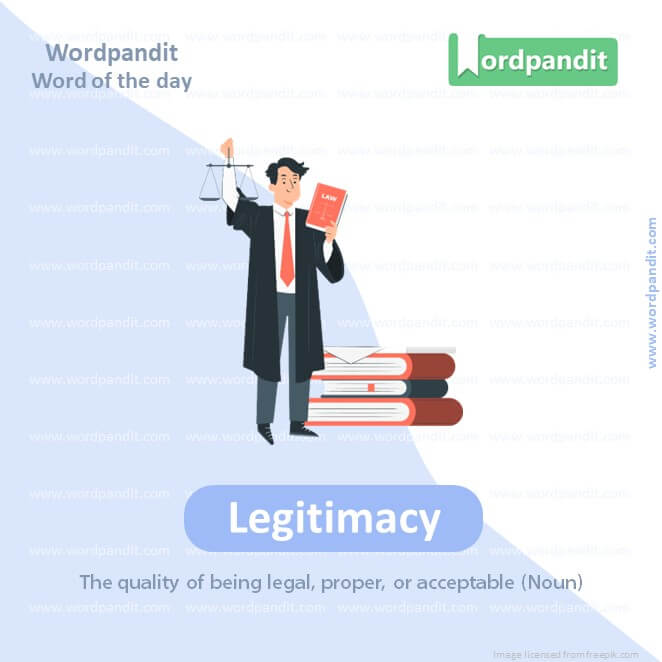
WORD-2: Legitimacy
CONTEXT: “Gaza as a Metaphor and the Right to be Human”, was the title of a paper that I wrote for a conference on International Law and the State of Israel: Legitimacy, Responsibility and Exceptionalism that took place in Cork, Ireland from March 31-April 2, 2017. Due to health issues, I was not able to attend the conference in person and my paper was read by my husband.
SOURCE: Al Jazeera
EXPLANATORY PARAGRAPH: Legitimacy is like when everyone agrees that something is right or should be allowed. It’s like when your parents say it’s okay to stay up late on a weekend.
MEANING: The quality of being legal, proper, or acceptable (Noun).
PRONUNCIATION: leh-JIT-ih-muh-see
SYNONYMS: Validity, Authenticity, Legality, Rightfulness, Justifiability
USAGE EXAMPLES:
1. The legitimacy of the new law was questioned by many.
2. He proved the legitimacy of his claim with documents.
3. The election’s legitimacy was confirmed by international observers.
4. They discussed the legitimacy of the government’s decision.
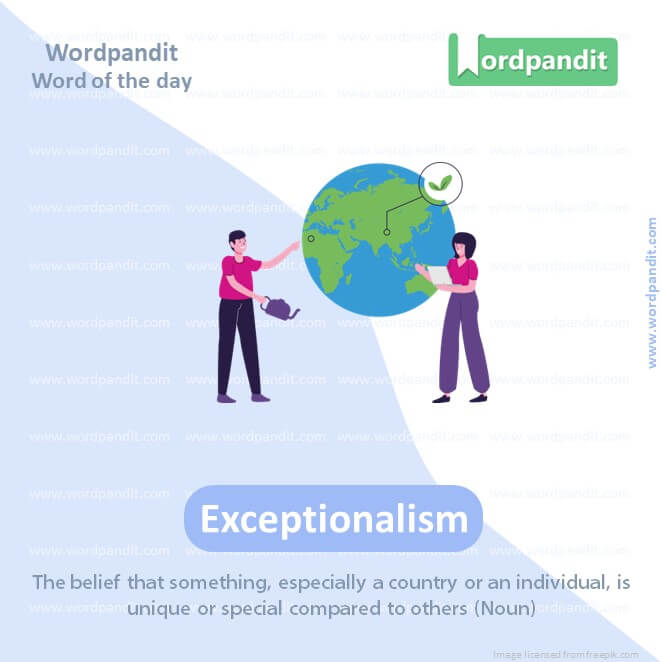
WORD-3: Exceptionalism
CONTEXT: “Gaza as a Metaphor and the Right to be Human”, was the title of a paper that I wrote for a conference on International Law and the State of Israel: Legitimacy, Responsibility and Exceptionalism that took place in Cork, Ireland from March 31-April 2, 2017. Due to health issues, I was not able to attend the conference in person and my paper was read by my husband.
SOURCE: Al Jazeera
EXPLANATORY PARAGRAPH: Exceptionalism is thinking you or your group is special and different from others, like believing your soccer team is the best in the whole city.
MEANING: The belief that something, especially a country or an individual, is unique or special compared to others (Noun).
PRONUNCIATION: ek-sep-SHUH-nuh-liz-um
SYNONYMS: Uniqueness, Specialness, Distinctiveness, Singularity, Rarity
USAGE EXAMPLES:
1. American exceptionalism is a topic of debate in politics.
2. The theory of exceptionalism often leads to national pride.
3. She argued against the idea of exceptionalism in sports.
4. The exceptionalism of the artist’s style made him famous.
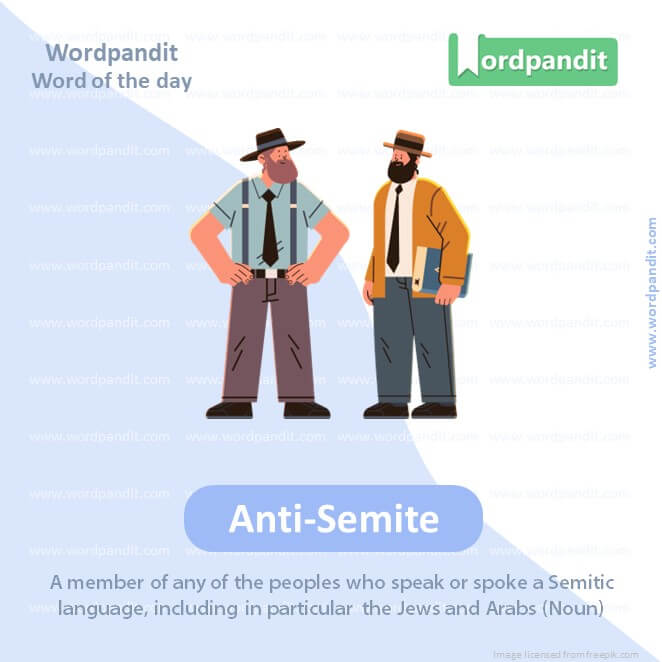
WORD-4: Anti-Semite
CONTEXT: From what I learnt afterwards, it stirred some emotions and, as expected, I was even accused (not for the first time) of being an anti-Semite and a Holocaust denier by a Christian attendee. I also found out later that the label “jihadist” was used to vilify me in some Israeli websites whose mission is to mark and label as “traitors” Jewish people, and particularly Israeli Jews, critical of Israel.
SOURCE: Al Jazeera
EXPLANATORY PARAGRAPH: A Semite is a person who belongs to a group of people who lived in some places like the Middle East. It’s like being part of a big family that comes from the same area.
MEANING: A member of any of the peoples who speak or spoke a Semitic language, including in particular the Jews and Arabs (Noun).
PRONUNCIATION: SEM-ite
SYNONYMS: Hebrew, Israeli, Arab, Jewish person, Middle Easterner
USAGE EXAMPLES:
1. Semites historically lived in the Middle East.
2. The study focused on the languages spoken by Semites.
3. She traced her ancestry back to the ancient Semites.
4. Many Semites have played significant roles in history.
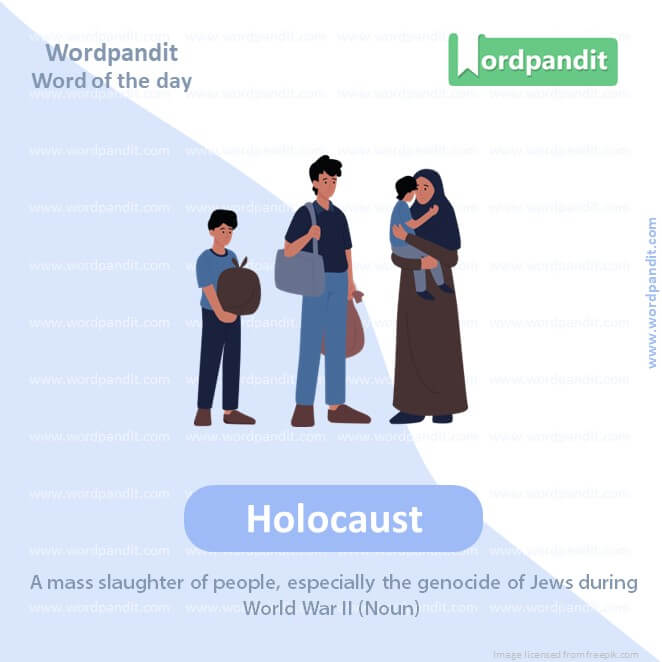
WORD-5: Holocaust
CONTEXT: From what I learnt afterwards, it stirred some emotions and, as expected, I was even accused (not for the first time) of being an anti-Semite and a Holocaust denier by a Christian attendee. I also found out later that the label “jihadist” was used to vilify me in some Israeli websites whose mission is to mark and label as “traitors” Jewish people, and particularly Israeli Jews, critical of Israel.
SOURCE: Al Jazeera
EXPLANATORY PARAGRAPH: The Holocaust was a very sad time when a lot of people, especially Jewish people, were hurt and lost their lives because of unfair and cruel treatment.
MEANING: A mass slaughter of people, especially the genocide of Jews during World War II (Noun).
PRONUNCIATION: HOL-uh-kawst
SYNONYMS: Genocide, Massacre, Annihilation, Pogrom, Extermination
USAGE EXAMPLES:
1. The Holocaust is an important event in world history.
2. Survivors of the Holocaust shared their stories.
3. Memorials are held to remember the victims of the Holocaust.
4. Educating about the Holocaust is important to prevent such tragedies in the future.
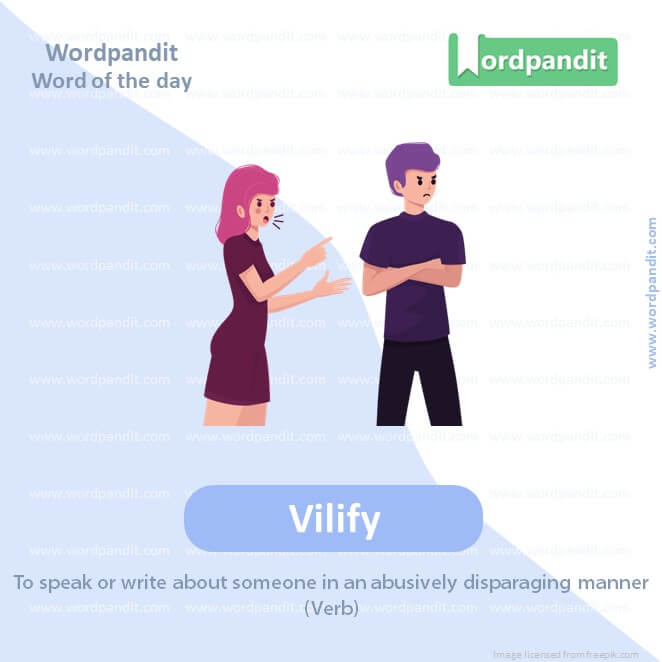
WORD-6: Vilify
CONTEXT: From what I learnt afterwards, it stirred some emotions and, as expected, I was even accused (not for the first time) of being an anti-Semite and a Holocaust denier by a Christian attendee. I also found out later that the label “jihadist” was used to vilify me in some Israeli websites whose mission is to mark and label as “traitors” Jewish people, and particularly Israeli Jews, critical of Israel.
SOURCE: Al Jazeera
EXPLANATORY PARAGRAPH: To vilify someone is like saying very mean and untrue things about them, making others think they are a bad person.
MEANING: To speak or write about someone in an abusively disparaging manner (Verb).
PRONUNCIATION: VIL-ih-fye
SYNONYMS: Defame, Denigrate, Slander, Libel, Disparage
USAGE EXAMPLES:
1. The politician was unfairly vilified by the media.
2. He was vilified in the press as a villain.
3. They should not vilify her without evidence.
4. To vilify someone’s character is a serious accusation.
WORD-7: Grotesque
CONTEXT: The accusation of being a Holocaust denier is beyond the grotesque. I was named Yosefa after my mother’s father Yosef, who was murdered in Treblinka, perhaps the most horrific Nazi extermination camp in Poland. My mother was the only survivor of her family.
SOURCE: Al Jazeera
EXPLANATORY PARAGRAPH: Grotesque is when something looks very strange and maybe a little scary or funny, like a monster in a story with a big head and tiny legs.
MEANING: Comically or repulsively ugly or distorted (Adjective).
PRONUNCIATION: grow-TESK
SYNONYMS: Bizarre, Ugly, Distorted, Outlandish, Surreal
USAGE EXAMPLES:
1. The grotesque statue scared the children.
2. His story was filled with grotesque characters.
3. The painting depicted a grotesque landscape.
4. The film used grotesque imagery to create an eerie atmosphere.
WORD-8: Horrific
CONTEXT: The accusation of being a Holocaust denier is beyond the grotesque. I was named Yosefa after my mother’s father Yosef, who was murdered in Treblinka, perhaps the most horrific Nazi extermination camp in Poland. My mother was the only survivor of her family.
SOURCE: Al Jazeera
EXPLANATORY PARAGRAPH: Horrific is when something is really scary or terrible, like a very bad nightmare or a scary movie with monsters.
MEANING: Causing horror, very shocking (Adjective).
PRONUNCIATION: haw-RIF-ik
SYNONYMS: Terrifying, Frightening, Horrendous, Appalling, Ghastly
USAGE EXAMPLES:
1. The news reported a horrific accident.
2. She had a horrific experience during the storm.
3. The movie was filled with horrific scenes.
4. They witnessed a horrific event that they would never forget.
WORD-9: Extermination
CONTEXT: The accusation of being a Holocaust denier is beyond the grotesque. I was named Yosefa after my mother’s father Yosef, who was murdered in Treblinka, perhaps the most horrific Nazi extermination camp in Poland. My mother was the only survivor of her family.
SOURCE: Al Jazeera
EXPLANATORY PARAGRAPH: Extermination is like getting rid of something completely, usually something bad, like when you try to make all the ants in your house go away forever.
MEANING: The act of killing or destroying completely (Noun).
PRONUNCIATION: ek-ster-muh-NAY-shun
SYNONYMS: Annihilation, Eradication, Destruction, Elimination, Wipeout
USAGE EXAMPLES:
1. The extermination of pests is necessary in some cases.
2. The book discussed the extermination of certain species.
3. Plans for the extermination of the virus were discussed.
4. The policy led to the extermination of natural habitats.
WORD-10: Perpetuated
CONTEXT: I would like to start by saying that despite the title of my paper I am fully aware that Gaza is not only a metaphor, but also a very harsh reality deliberately created and perpetuated by Israel.
SOURCE: Al Jazeera
EXPLANATORY PARAGRAPH: Perpetuated is like making something continue or go on for a long time, like telling the same family story over and over again so everyone remembers it.
MEANING: Made something continue indefinitely (Verb, past tense).
PRONUNCIATION: per-PET-yoo-ay-tid
SYNONYMS: Continued, Prolonged, Sustained, Maintained, Propagated
USAGE EXAMPLES:
1. The myth was perpetuated through generations.
2. False information was perpetuated by social media.
3. The tradition was perpetuated by the community.
4. The conflict was perpetuated by misunderstandings.
Vocabulary Grammar
The journey of language mastery is a thrilling blend of words and structure, often referred to as ‘vocabulary grammar’. These critical components of any language work hand in hand to facilitate meaningful communication. However, embracing ‘vocabulary grammar’ requires a nuanced understanding and a strategic learning approach.
The initial step towards understanding ‘vocabulary grammar’ is to study the functionality of words in a sentence. Grammar holds the key to how vocabulary is structured in language. Therefore, observe how words change or influence meaning when placed differently in a sentence.
Leveraging diverse resources is a great way to grasp ‘vocabulary grammar’. Engage with a range of reading materials, audio-visual resources, and interactive language apps. This offers genuine exposure to ‘vocabulary grammar’ in real-world contexts and enhances comprehensive learning.
While learning ‘vocabulary grammar’, it’s important to see vocabulary and grammar as interconnected. Understanding how different parts of speech function can help in the effective usage of vocabulary. Try creating your own sentences using new vocabulary following certain grammatical rules to reinforce learning.
Revision holds its due significance in mastering ‘vocabulary grammar’. Regular review of learnt grammar rules and vocabulary ensures long-term retention and bolsters understanding. Use techniques like spaced repetition to make your review sessions more effective.
Lastly, practicing ‘vocabulary grammar’ is key to cementing your knowledge. Whether it is through writing exercises or conversing in the language, practicing allows you to apply ‘vocabulary grammar’ in a practical context and aids in accurate language use.
In conclusion, understanding ‘vocabulary grammar’ calls for conscious observation, diversified resources, interconnected learning, regular revision, and relentless practice. As you navigate this path, you will see ‘vocabulary grammar’ like two sides of the same coin, both essential to the value it holds in the wealth of language learning.













